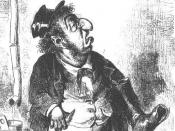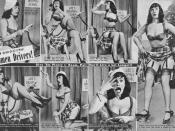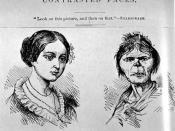Stereotyping is a mental activity that is neither natural or necessary; however, due to laziness, upbringing or coincidental experiences (Lester, 1996, p.1), the stereotyping of individuals results in harmful generalisations that ultimately deny an individual's 'unique contribution to humanity' (Lester, 1996, p.1). When the mass media engage in stereotyping, misleading representations concerning members from diverse cultural groups are confirmed. In this essay, a broad range of texts will be used to
examine the ways in which the mass media construct and reinforce social stereotypes around gender, ethnicity and age, as well as how the media shape one's imagination though direct images.
It cannot be doubted that the media profoundly influence people's attitudes and outlooks. They convey a whole variety of information which individuals would not otherwise acquire. Newspapers, books, television, radio, films, recorded music and popular magazines (Giddens, 1989, p.79) bring individuals into close contact with experiences of which we 'would otherwise have little awareness' (Giddens, 1989, p.
79). There are very few societies, in current times, even among the more traditional cultures, which remain completely untouched by the mass media. Electronic communication is accessible even to those who are completely illiterate, or in isolated areas of the world.
According to Juredini and Poole, gender usually refers to the 'behavioural and attitudinal characteristics' as well as roles that are learned and derived from a 'particular cultural milieu' (2000, p.171). An important source of gender information in a consumer society is television. Despite some notable exceptions, for example 'Sesame Street', most television shows continue to portray males and females in stereotypical gender roles (Sigorelli, 1990, citied in Newman, 2000, p. 136). In a recent study of television programs, male characters are more likely than female characters to occupy leadership roles and achieve them, as well as being portrayed as inquisitive.


